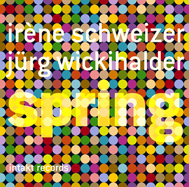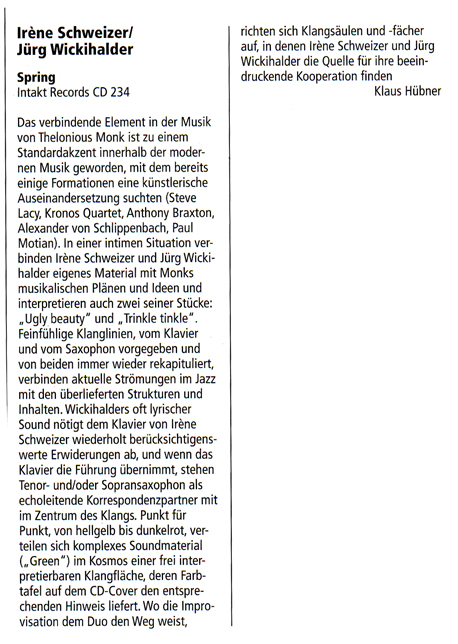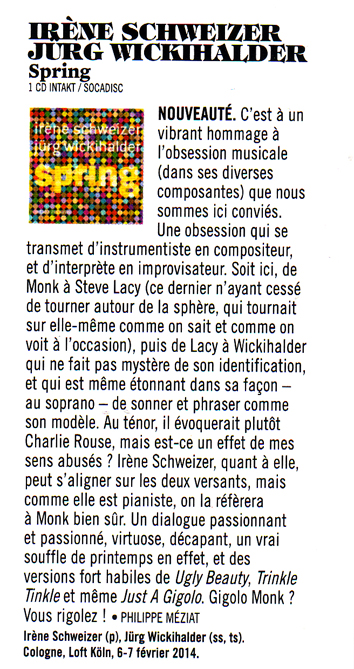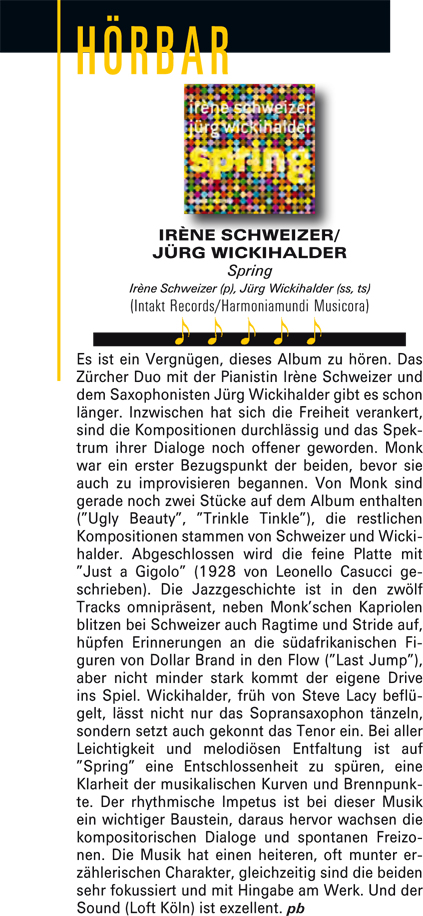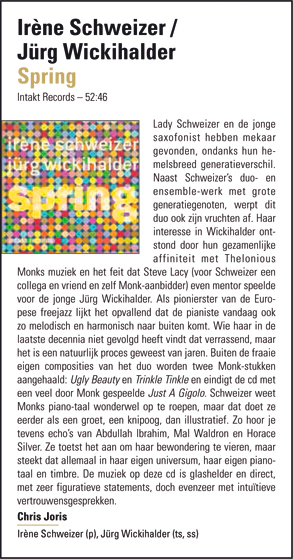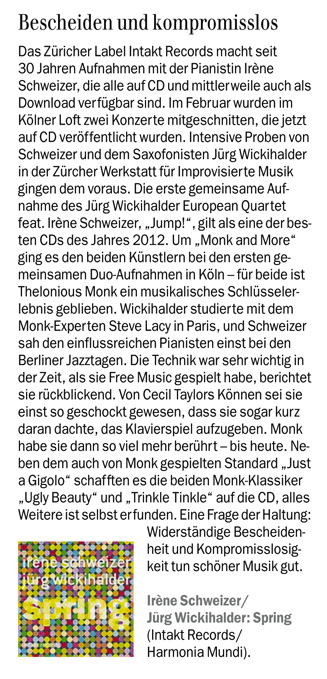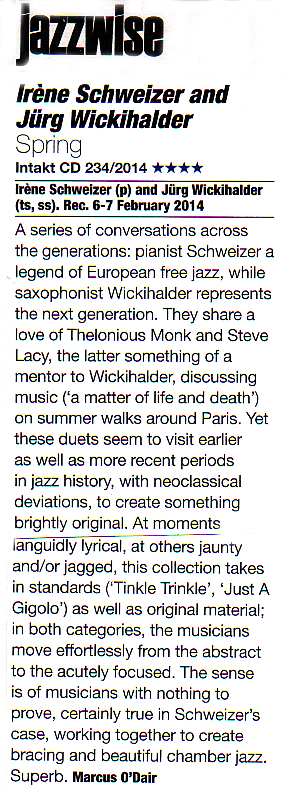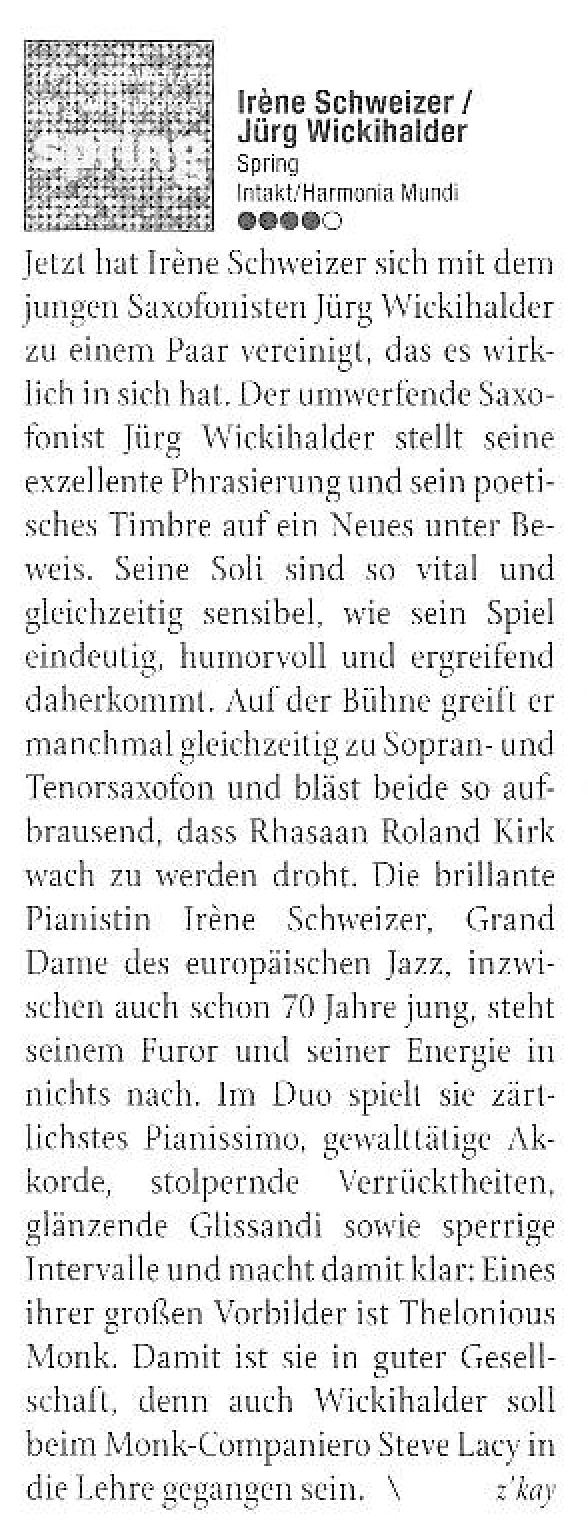INTAKT RECORDS – CD-REVIEWS SCHWEIZER - WICKIHALDER
Manchmal wäre Lob nur töricht. IRENE SCHWEIZER ist so ein Fall. Wem müsste sie noch was beweisen? Was ließe sich über ihre Spielkunst sagen, was nicht schon gesagt wurde? Sie zu loben, hieße, dass es auch anders sein könnte. Aber dazu müsste sie schon besoffen vom Stuhl fallen. Spring (Intakt CD 234) zeigt die große Pianistin im Verbund mit dem Saxophonisten JÜRG WICKIHALDER, mit Baujahr 1973 ein Prachtkerl der übernächsten Swiss-Jazz-Generation. Mit dem hat sie in dessen European Quartet und in vielen Duetten ein blindes Vertrauensverhältnis entwickelt, das die beiden selbst in einem Dunkelrestaurant keine Sekunde im Dunkeln tappen lässt. Wickihalders Leitstern ist Steve Lacy und mit Schweizer teilt er dessen Bewunderung für Thelonious Monk, von dem sie 'Ugly Beauty' und 'Trinkle Tinkle' anstimmen. Ihre eigenen Improvisationen und Kompositionen - insbesondere '6243D', das fast entgleist, aber doch nur fast - sind animiert von Monks vertracktem Genie. Wobei Schweizer noch an weitere Tiefenschichten rührt, mit klingelnden Ragtime- und Stride-Figuren aus Prä-Bop-Tagen. Jedoch ohne Gefälligkeiten für Leute, die klatschen, wenn sie 'Tea for Two' erkennen. Vielmehr immer wieder verblüffend Pfiffiges, wenn Wickihalder etwa von einem gassenhauerischen Anklang zum nächsten rösselspringt oder on 'The Road' kapriolt. Da prickeln Salz und Pfeffer, da wirbeln die Finger in akrobatischer Beiläufigkeit, extrem sophisticated, manchmal fast slapstickartig im sopranistischen Gesprudel und den launigen Bocksprüngen. Ohne dass das Lyrische zu kurz kommt - 'Köln' ist dafür ein gutes Beispiel. Weil Schweizer als Intro und Extro ins Innenklavier greift und Wickihalder einmal mit gurrenden Lauten das bloß Lyrische relativiert. Einen weiteren Kontrast schaffen die Tenorgesänge bei 'Green' und, noch versonnener und inniger, bei 'Last Jump' und 'Blue'. Und fast schon perelmanesk, aber doch etwas mürber und brüchiger, bei 'White'. Wobei Schweizer immer schön lakonisch gegenhält. Mit 'Just a Gigolo' gibt es zuletzt noch einen Ohrwurm, den auch schon Monk gerne mal zermonkt hat.
C'est l'univers de Thelonious Monk qui a réuni la grande pianiste Irène Schweizer et le jeune saxophoniste Jürg Wickihalder, lequel a rencontré et joué avec un grand monkien, Steve Lacy, d'où son choix premier du soprano. Monk est présent dans cet échange avec deux thèmes et… Just A Gigolo, Wickihalder en apporte cinq et en partage plusieurs autres avec la pianiste. Au-delà du jeu du saxophoniste, on remarquera une fois de plus la qualité d'écoute d'Irène Schweizer, sa réactivité, son à-propos, sa présence et ses qualités d'accompagnatrice car, là, on peut réellement parler d'accompagnement, dans le meilleur sens du terme.
Whether leading his Drum Quartet, seven-piece Zoom ensemble or supporting fabled improvisers, bassist Barry Guy and guitarist Fred Frith, Swiss drummer Lucas Niggli is not one to play it safe or dodge risk-taking processes. His mantra is firmly implanted in a musical world that is assuredly outside the box, after appearing on nearly two-dozen albums for Intakt Records. On Arcanum, Niggli takes another leap of faith by teaming with free-form vocalist Andreas Schaerer. Besides the drummer's colossal sound and enviable technique, the twosome sparks esoteric dialogues, perhaps signaling tribal music for the modern era with an air of antiquity, especially during the vocalist's sanctified chants and perceptive use of electronics effects. Niggli and Schaerer often operate at warp speed or temper the proceedings when exploring dimly lit panoramas.
Guido Festinese, Il Manifesto, Italia, 2. Nov 2014
Novità dalla Intakt Dalla label svizzera Intakt provengono sempre proposte interessanti, che ci forniscono un significativo spaccato della ricerca jazzistica europea. Pur facendo i conti con i clichè di riferimento (l'avanguardia degli anni '70), si impongono modalità di grande spessore espressivo. MAURIZIO ZERBO, All About Jazz Italia, October 29, 2014
Dass sich die beiden gut kennen, wird sofort hörbar, und immer wieder. Es wird nicht lange gefackelt in diesem Duo, gutes Einvernehmen und gegenseitiger Respekt machen Regeln und Anstand quasi obsolet. Und so ist es ein bisschen wie in familiären oder freundschaftlichen Beziehungen – man spricht laut und deutlich miteinander und geht dabei bald unbekümmert aufeinander los, bald verständnisvoll aufeinander ein. Die Rede ist vom Zusammenspiel zwischen dem Tenor- und Sopransaxofonisten Jürg Wickihalder und der Pianistin Irène Schweizer. «Spring» heisst ihr neues Duo-Album – und wer sich erinnert, dass eine frühere, in erweiterter Besetzung eingespielte CD «Jump!» (2011) hiess, wird auch bei diesem Titel nicht nur an blühende Blümchen denken, sondern auch an Abgründe, an Sprungbretter oder an den Übergang vom Thema zur Improvisation. Die beiden Duo-Partner wirken in den Stücken – Eigenkompositionen, zwei Titel von Thelonious Monk und ein schöner Schlager («Just a Gigolo») – zwar feinfühlig, aber ziemlich impulsiv. Ihr Interplay ist eher witzig und hitzig als abgeklärt und vernünftig. Ganz zum Vergnügen der Zuhörer, die immer wieder erleben, wie hier Phrasen im Zeichen von Streit und Versöhnung aufeinanderprallen, um so letztlich eine innige Kraft zu generieren.
Klaus Hübner, Jazzpodium, November 2014
Pianisten Irene Schweizer har vært en av Europas ledende pianister i flere tiår, men det er vel egentlig først de senere årene, og hgjennom hennes utgivelser på sveitsiske Intakt Records at hun har blitt en pianist man regner med rundt om i hele verden. Saksofonisten Jürg Wickihalder kommer også fra Sveits, men har bl.a. studert under Steve Lazy, noe man lett kan gjenkjenne i hans spillemåte.
Philippe Méziat, Jazzman/Jazzmagazine, Paris, Novembre 2014
Pirmin Bossart, Jazz'n'more, Schweiz, November-Dezember 2014
Misura dopo misura - ma il percorso è adesso pressoché sterminato - l'arte della veterana del piano da Sciaffusa è pervenuta a chiaro coronamento: artista completa che può davvero vantarsi senza vanagloria alcuna di aver abitato, ed in varie forme segnato, le più significative stagioni della musica creativa nonché le più polemiche fasi del'Euro-jazz, Irène Schweizer non manca un'occasione per sancire la propria eminente sapienza e l'enorme talento immaginativo.
Am diesjährigen Jazzfestival Basel freuten wir uns unter anderem auf den Auf- tritt des experimentierfreudigen New Yorker Pianisten Uri Caine. Im Vorprogramm spielten mit Irene Schweizer und Pierre Favre zwei der ganz grossen und verdienten Alleskönner der Schweizer Jazzszene. Die beiden fesselten das anwesende Publikum mit grosszügigem Charme und liebevoller Selbstverständlichkeit. Ihre Ansagen und ihr unaufgeregtes Duospiel verblüfften dank echter Ehrlichkeit, die beiden boten ein Alterswerk der Extraklasse. Sie brauchten niemandem mehr Rechenschaft zu schulden, machten das, was sie wirklich und unbeeinflusst wollten und sorgten für den Höhepunkt des Abends.
Chris Joris, Jazzmozaiek, Belgium, 4-2014
Christian Broecking, Berliner Zeitung, 4. Jan. 2015
It is odd to think that Steve Lacy never recorded with Irène Schweizer. Their paths must have crossed along the way during Lacy's extended tenure in Europe, but from what I can find, never appear to have performed together. That may seem an odd lead to a review of this meeting between Schweizer and the Swiss saxophonist Jürg Wickihalder, but Lacy's visage is all over this recording. Schweizer and Wickihalder found initial common ground in the music of Thelonious Monk, digging in to his compositional forms with the structural curiosity Lacy brought to Monk's music. In fact Lacy's recording of Monk's music, Reflections, was a seminal influence on Wickihalder. In the early '90s, the reed player tracked Lacy down in Paris and took a series of lessons which were formative to his approach to both reed playing and improvisation. While the two don't cover any of Lacy's compositions, his mark is clearly heard on the set comprised of five originals by Wickihalder, one by Schweizer, three spontaneous improvisations, two by Monk, all capped off by the standard "Just a Gigolo" which Monk often covered.
Marcus O'Dair, Jazzwise, London, February 2015
z'kay, Klinkes, Februar 2015
As readers of my reviews know I am a big fan of Ms. Schweizer. I own a lot of her records, many of which are duets. Here she is in duo with a saxophonist. The opening chords lead in to a Monkish tune, which is a good thing. The solos go a bit further out than Monk, but stay true to the tune. And, of course, the interplay between the two is excellent. This feeling is continued through much of the CD. I think is largely because Wickihalder’s soprano playing reminds me a bit of Steve Lacey, and he uses short phrases which are reminiscent of Monk. On tenor he has a nice bit of vibrato but can also get up in the higher register with a bit of a scream. But he can also be very lyrical, especially on “Jump.” And Schweizer is with him all the way. But for me the CD is about Schweizer and how she performs with such different people in duo format. And, as expected, she performs extremely well. She carries “Road” with some wonderful single not accompaniment by Wickihalder. Her playing is two handed but melodic, and she is always harmonically inventive. And all of this leads up the all too short version of Trinkle Tinkle. They capture Monk’s feel while being completely original. Wickihalder really reminds me of Lacy here and Schweizer captures Monk’s feel while still maintaining her flowing style. I am not sure what else to say except that this is another excellent CD by Schweizer. I look forward to hearing her in other duo formats. Bernie Koenig, Cadence Magazine Volume 41, No. 2 / 2015 (April, May, June), USA
On his only previous session in duet with piano -A Feeling For Someone (Intakt, 2008) -Swiss reedman Jurg Wickihalder's indebtedness to that master of the straight horn Steve Lacy was still evident. But on Spring, in the company of the iconoclastic pianist Irene Schweizer, Wickihalder sounds entirely his own man. Both principals boast serious avant-garde credentials, Schweizer as one of the first European pianists to assimilate the lessons of Cecil Taylor, and Wickihalder more recently as a member of the Barry Guy New Orchestra. But while those attributes color their contributions, the overwhelming impression is of two sympathetic partners having a ball. |
